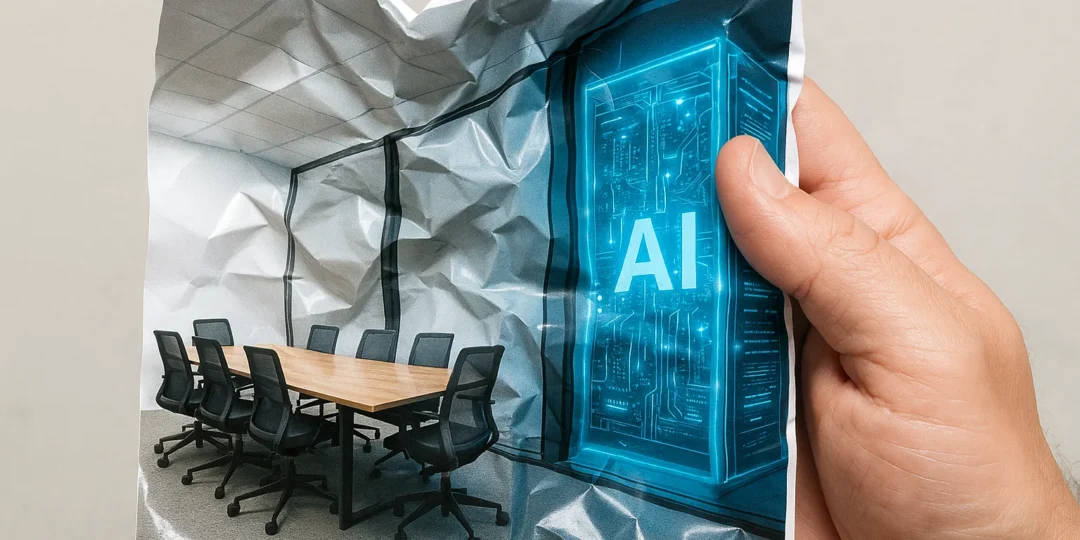AI and work presents a fork: redistribution within the workplace, or redefinition of the workplace. A socialist analysis should distinguish between the two. Vivek Chibber’s recent piece in Jacobin doesn’t.
Continue readingThe Texture of Progress
In a recent exchange about the current state of AI—the strange tension between “slop” output and “human-level” reasoning—the conversation inevitably turned to the Industrial Revolution. It usually does. When we are faced with a technology that feels like it might be a “clean break” from the past, we go looking for historical precedents to help us build a narrative for the future.
The problem is that we often go looking for clean mechanisms in the past to justify our predictions for the present.
Continue readingWhy every prediction about AI and work is already wrong
In 2023 Felten et al took a snapshot of work-as-described and asked which bits looked like language tasks. It aged badly because the snapshot mistook the current frame for a stable target. A 2026 NBER chaining paper is more sophisticated—it sees that adjacency and sequence matter, not just task content—but it still assumes the step structure is given and stable enough to reason about. It too will age badly. Both use deductive models of a system that evolves faster than the models can be validated.
Continue readingAI and the Filter 1 Problem
A recent review by Alex Imas and Madhav Shukla provides a useful roundup of who is using AI and how. But while the analysis inside the frame is thorough, the frame itself deserves scrutiny.
The authors implicitly assume that AI has passed what I call a Filter 1 test: demonstrating clear, firm-level financial gains at market prices, independent of subsidized pilots or venture-backed “free tiers.”
If we look at the history of transformative technologies, the winners didn’t just diffuse—they pulled themselves into existence by solving a problem so clearly that firms couldn’t afford not to adopt them.
Continue readingTool-to-Work vs Work-to-Tool
There’s a fundamental tension between the top-down tool-to-work model foundational in economics and the bottom-up work-to-tool model we see across other disciplines—a tension that Mokyr’s recent Nobel highlights. The […]
Continue readingStop Comparing AI to Railroads. It’s More Like the Crypto Boom.
Another day, another article telling us the AI boom is just like the railroad buildout of the 1800s. “Don’t worry about the bubble—infrastructure always finds its users eventually!”
This is dangerously wrong. Here’s why.
Continue readingAI and the Art of the Mundane Breakthrough
The Economist piece on “What if artificial intelligence is just a “normal” technology?“, got me thinking about historical analogies and how we construct them.
Narayanan and Kapoor use factory electrification—a 30-year process requiring total rethinks of floor layouts and organizational structures. But this example has always felt like classic post-hoc sense-making: we see a transformation, find the “disruptive technology” preceding it, and assume causation.
A better analogy might be the PC. There wasn’t a 30-year lag waiting for “adoption.” What we saw was a broader wave of business process reengineering that crystallized around regulatory requirements like ERP. PCs participated in this transformation but didn’t cause it.
The difference matters for how we think about AI deployment. If it’s like electrification, we’re waiting for organizations to slowly restructure around the technology. If it’s like PCs, we’re watching AI get absorbed into larger systemic changes already underway—remote work acceleration, regulatory digitization, skill verification crises.
Continue readingThe Crooked Path
Why Breakthroughs Disappoint and Work Delivers
You know that feeling when you read about the latest “breakthrough” technology that’s going to change everything—fusion finally working, quantum computers achieving some new milestone, brain-computer interfaces getting closer to reality—and part of you feels excited but part of you thinks, haven’t I heard this before?
I’ve been carrying around a low-level disappointment about technology promises for years now. Remember when VR was going to transform everything? You bought into the hype, got a headset, used it enthusiastically for maybe two weeks, and now it’s gathering dust in a closet. Or self-driving cars: we’ve been perpetually “just a few years away” from full autonomy for over a decade now (and the current rollout still relies on an operations centre with remote drivers). Blockchain was going to revolutionise everything from voting to supply chains, but mostly it revolutionised speculation and energy consumption.
This got me wondering: why does this keep happening?
Continue readingWorld Models and the Anchoring Problem
The AI research community is having another moment with world models. Quanta Magazine’s recent piece traces the concept back to Kenneth Craik’s 1943 insight about organisms carrying “small-scale models” of reality in their heads. Now, with LLMs showing unexpected capabilities, researchers are betting that better world models might be the key to AGI.
But there’s something revealing happening in this revival. The more we try to find coherent world models in current AI systems, the more we discover what researchers call “bags of heuristics”—disconnected rules that work in aggregate but don’t form unified understanding. When MIT researchers tested an LLM that could navigate Manhattan perfectly, it collapsed when just 1% of streets were barricaded at random. No coherent map, just an elaborate patchwork of corner-by-corner shortcuts.
This raises the grounding question: what keeps intelligence honest?
Continue readingThe AI Productivity Paradox
The recent decline in entry-level employment is not a consequence of AI’s revolutionary power. Instead, it is a symptom of a maturing industry entering a low-growth phase. AI is serving as a tool for cost optimisation rather than a driver of new value creation.
If generative AI were truly a general-purpose technology on par with electricity or the micro-processor, the macro data should already be unmistakable. Instead, the silence is deafening.
Continue reading



